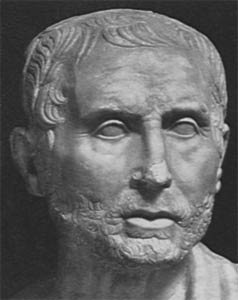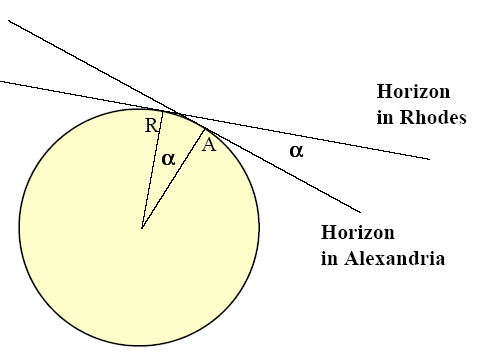.
Griechische Astronomie: Die Messung des Erdumfangs nach Posidonius
Eratosthenes determined the circumference of the Earth around 205 BC to be 250000 or 252000 stades according to various sources. He noted that, on the summer solstice, the sun casts no shadow in Syene but he knew that it casts a shadow in Alexandria, north of Syene, corresponding to an angle α = 7o 12' (or approximate 7.2o). In other words he determined that the distance between Alexandria and Syene was one-fiftieth of the Earth's circumference. Since he knew that the two cities were about 800 km apart, he concluded that the the Earth must be 50 * 800 km in circumference, or 40000 km (See details). A century later Posidonius used another method to estimate the circumference of the Earth.

Posidonius of Apamea, c. 135-51 BC, was a Greek philosopher (Stoic), astronomer, geographer and meteorologist. Nicknamed "the Athlete", he was born in Apamea, northern Syria, and probably died in Rome. Posidonius was a student of Panaetius of Rhodes. He was a stoic with many influential friends. His pupils were Cicero and Pompey. As a geographer he traveled to North Africa, Britain, France, Germany, Italy and Spain. As Pytheas he believed the tide is caused by the Moon. In about 90 BC he estimated the astronomical unit a0 to be a0/rE = 9893 earth radii (rE), less than one half of the true distance. He measured the size of the Sun, which was greater and more accurate than one proposed by other Greek astronomers and Aristarchus. He measured the circumference of the Earth from the position of the star Canopus. Posidonius obtained a value of 240000 stadia. His method is based on observations of the star Canopus at Rhodes and Alexandria. Canopus or Alpha Carinae, is the second brightest star in the sky at magnitude -0.72. It is located well into the southern hemisphere, at -52° 42' (2000) and is barely visible on the southern horizon of even the southern US States or the African coast of the Mediterranean Sea. Canopus who remained invisible to a traveler in Greece, became just visible above the horizon at Rhodes, and then appeared higher and higher above the horizon as the traveler went further and further south.

Canopus is 310 light years from Earth. At Rhodes he observes that Canopus touches the horizon while at Alexandria it reaches an altitude of 7o 30'. Using a distance of 5000 stadia between Rhodes and Alexandria this gave Posidonius a value of 240000 stadia for the circumference of the earth. This is a accurate value produced because of two compensating errors. The 7o 30' should be really 5o 15' while the figure of 5000 stadia for the Rhodes to Alexandria distance is also incorrect. Later Ptolemy informs us via the writings of Cleomedes, Posidonius used the more accurate 3750 stadia for the Rhodes to Alexandria distance but kept his very inaccurate 7o 30' thus obtaining the figure of 180000 stadia for the circumference which is far too small. We should note, however, that Taisbak attempts to prove that attributing this far too small value of 180000 stadia to Posidonius is unfounded. Eratosthenes had given a much more accurate value of 252000 stadia 150 years before Posidonius.
Eratosthenes and the circumference of the Earth
a) Hipparchus the exact Astronomer , b) Hipparchus fails to measure the stellar parallax: one reason of not accepting Aristarchus model
Ptolemy the greatest ancient astronomer (even with possible data manipulations)
Archytas “proof” of an infinite Universe , Galaxies and Extraterrestrial life: Democritus, Epicurus and others
Did Hipparchus discover Newtons gravity and inverse square law?
Interesting Sites
The Hubble Space Telescope, Images, Information A demonstration of the amazing progress of Astronomy, Astrophysics and Cosmology in the last decades
| Ancient Greece
Science, Technology , Medicine , Warfare, , Biographies , Life , Cities/Places/Maps , Arts , Literature , Philosophy ,Olympics, Mythology , History , Images Medieval Greece / Byzantine Empire Science, Technology, Arts, , Warfare , Literature, Biographies, Icons, History Modern Greece Cities, Islands, Regions, Fauna/Flora ,Biographies , History , Warfare, Science/Technology, Literature, Music , Arts , Film/Actors , Sport , Fashion --- |

